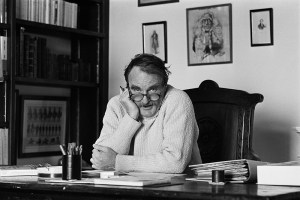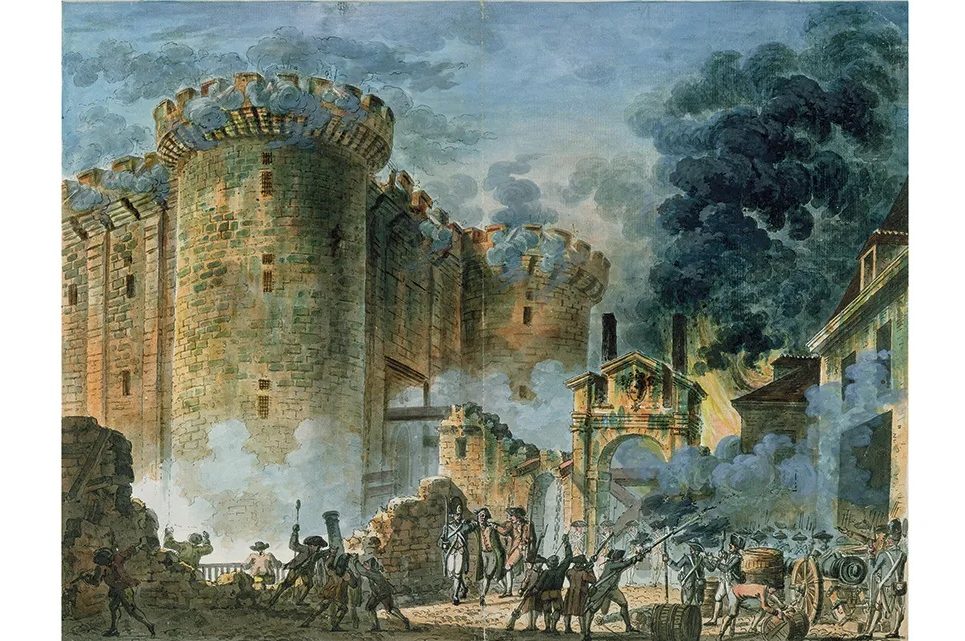William Boyd
Writing effective comedy is very difficult. True comic genius, the ability to create a unique tone of voice — deadpan, perfectly timed, self-deprecating, abjuring all whimsy (the British disease) and grandstanding — is extremely rare. One thinks of S.J. Perelman, Peter de Vries, the Grossmiths and P.G. Wodehouse amongst very few others. One name that can be added to this tiny and exclusive club is Theo Fennell who has published, this year, his memoir I Fear For This Boy: Some Chapters of Accidents (Bloomsbury, $35).
It relates incidents in Fennell’s life where everything that could go wronnd Catholic Churches as he veered between them. In this moving, uproariously funny at times, and searingly — almost masochistically — honest pages, it is clear that one promise he has been unswervingly faithful to is his promise as a writer.
Flora Fraser’s Pretty Young Rebel (Knopf, $30) is so well-researched, pacily written, full of new information and sympathetic to the Auld Cause that it almost makes one a Jacobite. Fraser’s own paternal heritage in the Highlands has clearly helped her to understand her subject, but as she makes very clear, MacDonald’s story does not end with her saving Bonnie Prince Charlie. How MacDonald wound up on the Hanoverian side in the American War of Independence is worthy of a novel or movie.
Harry Mount
Nina Stibbe’s latest novel, One Day I Shall Astonish the World (Little Brown, $27) buttresses her position as the Kingsley Amis of the twenty-first century. Just as Amis skewered red-brick universities in Lucky Jim, Stibbe does the same for a second-rate modern university in Leicestershire. The book is also about female friendship — specifically between low-achieving Susan, the narrator, and high-achieving Norma — and the petty wars that bubble away between so many friends.
Stibbe’s genius, like Amis’s, is for noting the cadences of ordinary speech and the idiotic platitudes we all spout. In the anatomy of English conversation, Stibbe (born 1962) takes up where Amis (died 1995) left off. There are echoes of Adrian Mole, Alan Bennett and Victoria Wood — but with no copying or pastiche. Stibbe makes the everyday funny. If a Martian asked me to explain the tragicomedy of normal English life, I would direct him to Stibbe.
Luke Thompson
Andrew Roberts’s recent book The Last King of America: The Misunderstood Reign of George III (Viking, $40) offers a pro-George perspective we didn’t know we needed. Roberts makes the persuasive case that George deserves better than he gets from conventional historical wisdom. This oft misunderstood and maligned monarch, Roberts argues, was no tyrant. Rather, George was possessed of earnest patriotism and love of learning, which merged into an unrivaled enthusiasm for advancing the cause of Great Britain on the world stage while deepening the constitutional embeddedness of royal power at home — all while plagued by acute episodes of mental illness.
The resulting figure is sympathetic and more than a little tragic. Possessed of high ideals, and beset by a cynical Whig oligarchy, George ushered his kingdom from rocky post-Revolutionary shoals to stable constitutional splendor, despite the loss of the American colonies. George deserves a sympathetic biography in this vein and the reader leaves convinced that George was a good man. Even if he was, in the end, the last king of America for very good reasons.
Anne Sebba
Two nonfiction books that have taken me into brilliantly imagined and never-to-be-forgotten worlds are Jonathan Freedland’s The Escape Artist (HarperCollins, $29) and Katherine Rundell’s Super-Infinite: The Transformations of John Donne (FSG, $30).
The Escape Artist is not simply a heart-stopping account of the first successful attempt by a prisoner to escape the hell of Auschwitz. Almost more shocking is Rudolf Vrba’s drive to tell the truth about the gas chambers and Nazi atrocities there to a world that did not want to know. Vrba’s desperation when he discovered how his plea for action was met with inertia or inability to imagine such horrors, and the damage this did to his postwar life and personal relationships, makes sobering reading.
Katherine Rundell’s engaging and original account of the complexities of John Donne’s multiple lives stretches the boundaries of how biography has traditionally been written in a wholly positive way. I knew Donne as a great love poet but discovered he was much more, in a book that almost fizzes with energy and wit as Rundell sets out how this philosopher became the embodiment of a man who grapples with what it means to be alive.
Philip Womack
This year, I very much enjoyed Benjamin Wood’s highly accomplished The Young Accomplice (Viking, $25) a novel which convincingly recreates the 1950s milieu of an architect’s utopian dream on a farm in England. This is disturbed when two young offenders are drafted in to help with labor. It’s idealistic, gripping and beautifully textured, moving with great power. It’s rare to see such attention to character and setting, and I think Wood is one of Britain’s best young writers. Natalie Standiford’s Astrid Sees All (Atria, $22) is a lovely, New York-based novel about a suburban girl trying to break into the “golden world,” capturing the danger and glamour of city life. And perhaps my favorite book of the year was a re-read — Anthony Hope’s The Prisoner of Zenda (Oxford, $10) which brought me galloping back to the heady, romantic dreams of childhood, with its fantastical plot and swashbuckling adventures.
A.E. Stallings
I really enjoyed Boris Dralyuk’s shimmering My Hollywood (Paul Dry, $17) — a book of virtuosic poems and translations about exile and Los Angeles, full of the faded glamour of nostalgia. Poet Ange Mlinko’s Venice (FSG, $26) — another book where geographical and metaphorical maps overlap — bowled me over with its panache, achievement and intelligent music.
Novels I enjoyed included the topical Grey Bees (Deep Vellum, $16) by Ukrainian novelist Andrey Kurkov (translated by Boris Dralyuk): I relished the wry humor of its portrait of a gentle beekeeper caught in the gray zone between armies. I stumbled upon The Latinist (Norton, $27) by Mark Prins in a bookstore, and I might be the ideal reader for this witty campus novel-cum-thriller, somewhat reminiscent of Possession, which centers on a female American postgraduate studying Latin poetry at Oxford, and hinges on choliambics and a scene out of Ovid’s Metamorphoses. I relished reading it and will look out for further Prins titles. The perfect gift for the Classics nerd in your life.
Jacob Heilbrunn
Christopher Buckley isn’t simply a marvelous humorist but also a corrosive observer of the American republic. Fresh from his novel Make Russia Great Again, Buckley scores once more with Has Anyone Seen My Toes? (Simon & Schuster, $27) a hilarious account of the travails of an aging screenwriter who is hunkered down in a coastal South Carolina town during the Covid pandemic with his second wife Peaches and stepson Themistocles.
In his exciting debut novel The Latinist (Norton, $27), Mark Prins offers a confrontation between the Old World and the New as his protagonist Tessa Templeton, a graduate student at Oxford by way of Florida, must overcome the nefarious machinations of her mentor Christopher Eccles, a prominent classicist. It’s hard to put down this modern version of the Daphne and Apollo myth.
Less racy but compelling is Ali Wyne’s America’s Great-Power Opportunity (Wiley, $25) which dispenses with the notion that America must inevitably cower before China. Wyne is a senior analyst at Eurasia Group. Far from being a hapless weakling, Wyne argues, America can emerge as primus inter pares. How right he is!
Gilbert T. Sewall
The most captivating book I’ve read this year is Edward J. Watts’s The Final Pagan Generation (University of California, $35), a careful, scholarly portrait of fourth-century Roman luminaries including the imperial tutor Ausonius. Watts contends the era was a time of great optimism and luxury, not anxiety. It did not think of itself as in crisis or decline.
During the fourth century, nonetheless, Christianity was an aggressive social force, illegal early on but by century’s end a state religion prohibiting pagan worship, wrecking its temples and stamping out its practices. For Watts, a vigorous Christian counterculture compares with an establishment of imperial toadies wrongly trusting the failing Roman political system to protect its time-honored beliefs. If he sometimes plays fast and loose with antiquity, overstating a fourth-century generation gap to underscore parallels to the present, so be it. Watts is perhaps the most intriguing, fluent classical historian writing today.
Christopher Sandford
I’m an early-modern history buff, and enjoyed Malcolm Gaskill’s latest tour of the seventeenth-century occult, The Ruin of All Witches: Life and Death in the New World (Knopf, $30). There’s plenty of brooms and cauldrons, but to Gaskill it’s generally not witchcraft in the abstract that’s interesting or revealing, but what was going on in individual people’s minds, and how they gradually passed from an obsession with the supernatural to a more enlightened age.
A bit late in the day, I also finished Zachary Leader’s encyclopedic The Life of Saul Bellow: Love and Strife 1965-2005 (Knopf, $22). Alongside its companion volume To Fame and Fortune, it’s the definitive treatment of one of the twentieth century’s greatest writers, even if both books sometimes linger over their analysis of Bellow’s novels rather than showing us the animating spirit behind them.
Fergus Butler-Gallie
Once Upon a Tome (Norton, $28) by Oliver Darkshire was a riot to read. A collection of tales from the weird and wonderful world of antiquarian bookselling, I devoured it almost in one sitting, routinely howling with laughter. I didn’t quite expect the world of rare books to be saturated in quotidian normality, but the extent of its eccentricity is one of the many joys of this deep dive between the shelves. Highly recommended indeed.
Amanda Craig
Despite having enormous resonance with current European events, the Serbian author Vesna Goldsworthy’s Iron Curtain (Norton, $29) was somehow overlooked by all the major prizes. It should not escape readers’ attention, however, as its tale of an Eastern European “princess” in an unnamed Slavic country, her love affair with the aristocratic Englishman Jason and escape to pre-Thatcher Britain is searingly good. Goldsworthy’s sardonic narrator depicts both the luxuries and hypocrisies of the Soviet system and the absurdities of the English caste system. An exquisitely well-written black comedy about love, family and treachery, it is modeled on Medea and has been justly praised by everyone from Rachel Cusk to William Boyd.
Lisa Hilton
My book of the year is The Restless Republic: Britain Without a Crown by Anna Keay (HarperCollins, $26). Given the profound influence of the English Civil Wars on Europe and North America, the story of the Protectorate, the period between 1649 and 1660 when England experimented with republicanism, has been neglected to an astonishing degree. Most people know the version that goes from the execution of Charles I to Oliver Cromwell being in charge and canceling Christmas to Charles II coming back to turn Whitehall into a forebear of the Playboy mansion; Keay’s wryly erudite multivoice history is the perfect corrective. From contextualizing the wars as the catalyst for an intellectual renaissance to relishing the gorgeous operas enjoyed by Cromwell, this is everything you didn’t know about Puritan power.
John R. MacArthur
Geoff Dyer gets my heartfelt recommendation for The Last Days of Roger Federer (FSG, $28) and not just because his book is so well-written and engaging. The challenge for any generalist author during lockdown was to resist the facile temptation to do a “lockdown diary” based on actual events and instead write something ambitious and original. Dyer used his downtime to re-explore books, music and art that had nothing to do, per se, with Covid-19 or mass death but everything to do with “endings,” especially the physical and mental decline of great artists, thinkers and tennis players (Turner, Nietzsche, Beethoven, Dylan and Federer, among others). The result is a metaphorical diary that confronts mortality without once portraying either a tragic Covid fatality or a feel-good story of recovery. We do get lively ruminations on comebacks: the novelist James Salter and jazz titan Duke Ellington enjoyed remarkable later-life resurgences, though Björn Borg fails to restore any semblance of his former greatness. And despite all the unhappy final acts described in the book, I experienced a paradoxical, post-Covid lift from learning that the tennis-crazed, often-injured Dyer hasn’t given up the game, or slowed down his writing.
Casey Chalk
This year saw two excellent books on gender controversies: The Genesis of Gender (Ignatius, $18) by Abigail Favale and Unraveling Gender: The Battle Over Sexual Difference (TAN, $25) by John S. Grabowski. The former is written by a former feminist academic, who speaks with the voice of an insider well-versed in the rhetoric of capricious gender ideologues. Favale expertly catalogs how feminists’ eagerness to jettison biology as essential to female identity has ironically undermined the objectives of the feminist movement. Grabowski’s work combines science, philosophy and theology to prove the illogic of our transgender moment.
Ryan Anderson’s and Alexandra DeSanctis’s Tearing Us Apart: How Abortion Harms Everything and Solves Nothing (Regnery, $30), a tour de force demolishing the arguments of the pro-choice movement, was perhaps 2022’s best-timed book, coinciding with Dobbs. Philosopher Ed Feser’s All One in Christ: A Catholic Critique of Racism and Critical Race Theory (Ignatius, $18) sounds pretty niche, but his critique of CRT on philosophical and logical grounds is unparalleled.
Chilton Williamson, Jr.
Lately I have been rereading, as I do every year, The Habit of Being: The Letters of Flannery O’Connor (FSG, $24), edited by Sally Fitzgerald, which — quite unintentionally on the author’s part — is both the best book on fiction writing I have ever read and the best introduction to the Catholic faith that to my knowledge exists.
Teresa Mull
The American novel is not dead. And neither is George Armstrong Custer. H.W. Crocker III proves both these truths in Armstrong and the Mexican Mystery (Regnery, $30), the third and last installment of his Custer of the West series. Custer’s bravado is boundless (as it is documented to have been in real life), and his cocksure way of talking, especially — and almost always — about himself, makes for a lighthearted, entertaining and very welcome escape from the doldrums of our “real” world.
Andrew Taylor
Few people in the world know more about crime and mystery fiction, past and present, than Martin Edwards. This year he published The Life of Crime (HarperCollins, $33) his authoritative history of the genre. Long, lively and opinionated, it’s a historical account stuffed with anecdotes about crime writers and acute judgements about their work. It’s worth buying just for the notes at the end of chapters — a joy in themselves.
Robert Harris’s political thrillers are an astonishing varied bunch, whose settings range from Ancient Rome to the far future, and which take in a range of interests from high technology to the intricacies of a papal election. This year he published Act of Oblivion (HarperCollins, $29) which imagines the North American afterlives of two regicides on the run — Cromwellian generals who were among the signatories of Charles I’s death warrant. It’s both a thrilling hunt for the fugitives and a reassessment of the traumas of the English Civil War.
Andrew Bacevich
Hot off the presses: Kennan: A Life between Worlds by Frank Costigliola (Princeton, $40). As diplomat, historian and public intellectual, George Kennan was arguably the most interesting American of his time. In this magnificent biography, Professor Costigliola presents the man in full: gifted, prophetic, prickly, prejudiced, patriotic, alienated from modernity and steadfast in his devotion to principle. A remarkable biography of a remarkable individual.
This article was originally published in The Spectator’s December 2022 World edition.





















